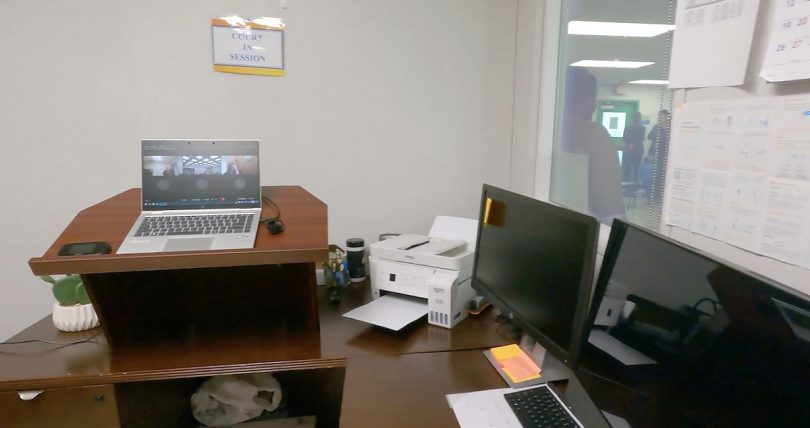On March 21, the LA County Public Defender’s Office officially launched the Community Outreach Court (COC), a program to help unhoused community members clear up legal issues that may block them from accessing housing.
During a three-month pilot period, the program, run in partnership with the Alternate Public Defender’s office, the LA City Attorney’s Office, and the LA Mayor’s Office of Community Safety, helped nearly 100 people clear eligible bench warrants, expunge convictions, and resolve misdemeanors and tickets (and associated fines and fees).
The COC currently sets up shop once a month at the Skid Row Community ReFresh Spot, a facility that offers showers, laundry, drinking water, pet supplies and other necessities to the residents of Skid Row. In this way, the COC brings access to legal assistance to people for whom accessing transportation to a court building or another legal aid clinic would be difficult.
“As public defenders, we understand that housing instability further complicates existing legal challenges for our most vulnerable neighbors,” said LA County Public Defender Ricardo Garcia. “Community Outreach Court builds on our commitment to addressing systemic barriers and ensuring equitable access to justice.”
The program even facilitates remote court appearances for misdemeanor cases.
“It is the first time we’ve actually had misdemeanor cases called,” said Deputy Public Defender Marcus Huntley. “So, when clients come here to Community Outreach Court at the ReFresh Spot, we have them on WebEx with the judge.”
Commissioner Karin Borzakian, hears the cases via web conference from her courtroom at the Central Arraignment Courthouse on Bauchet Street in Downtown LA.
According to PD Huntley, all of the misdemeanor cases Borzakian hears are resolved through diversion. The COC then links those individuals “with housing and mental health supportive services,” said Huntley. Between six months and a year later, their cases will be dismissed, he said.
“By offering legal assistance and facilitating connections to essential community-based services,” said LA County Public Defender Garcia, “we’re providing the necessary tools to help individuals rebuild their lives with the goal of preventing further contact with the criminal legal system.”
Yet, like other initiatives to reduce the criminal justice system burdens unhoused people face at the court level, the COC cannot solve a major underlying problem: criminalizing homelessness in the first place.
In 2019, LA City and County officials joined together to direct the LA County Superior Court to eliminate old warrants and fines for the minor infractions that ensnare low-income and unhoused people in the criminal legal system. This affected 398,000 warrants, 1,700,000 pending citations for offenses more than five years old, and any associated fines and fees.
Yet, afterward, Los Angeles continued to fine and charge people for infractions and crimes related to houselessness, mental health, and poverty — acts like sleeping in public, trespassing, stealing, and selling or possessing drugs.
The U.S. Supreme Court will also soon decide whether to uphold or overturn a lower court ruling restricting cities in western states, including California, from clearing homeless encampments.
The 9th U.S. Circuit Court of Appeals ruling prohibited Grants Pass, Oregon, as well as other cities in Alaska, Arizona, California, Hawaii, Idaho, Montana, Nevada, Oregon and Washington, from enforcing local ordinances banning unhoused people from “sleeping outside with rudimentary protection from the elements, or for sleeping in their car at night, when there is no other place in the city for them to go.”
Elected officials, including the Los Angeles County Board of Supervisors and CA Governor Gavin Newsom, have publicly supported the City of Grants Pass’s appeal, arguing that municipalities must be able to conduct encampment sweeps for the benefit of public health and safety.
Members of the public and representatives from local organizations called on the LA County Supervisors to choose a different path.
Yet, the board approved a motion to file or join an amicus brief in support of Grants Pass on February 6, 2024, arguing that the 9th Circuit ruling limits “the range of homeless policy tools available to the County as well as other local jurisdictions as it pertains to homeless encampments” in public areas.
“ACLU SoCal strongly opposes item #15,” wrote Kath Rogers, a staff attorney on the ACLU SoCal Dignity for All project focused on upholding the rights of unhoused individuals. Rogers called the criminalization of people living without shelter “unbelievably cruel.”
Data, the attorney said, shows that the rising cost of housing is pushing people out onto the streets. “How is giving someone a ticket or putting them in jail going to solve this?” Rogers wrote. “We see the effect of criminalization on our clients. They end up with tickets that turn into missed court dates that turn into warrants, and fines and fees they can’t afford. They are pushed from block to block, feeling the trauma of being endlessly chased by police.”
Other speakers said the board should instead focus on the county’s inadequate efforts to house people.
“It is foolish to join a lawsuit blaming unhoused participants instead of failed policies and inefficient housing programs,” Andrea Theodore wrote in a comment to the board. “Instead of frustration and legal action, let’s use common sense approaches and provide solutions. Let’s not give up and blame the unhoused but spend money on faster housing models and opening low income motels.”

